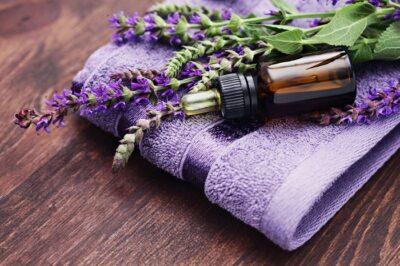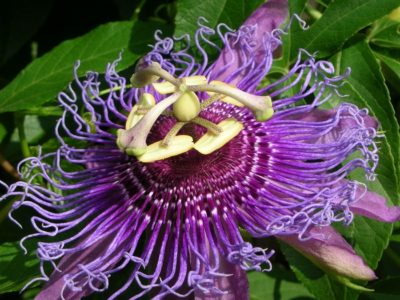
Image source: wikipedia
Sleeplessness is a very real problem, affecting more than 20 percent of adult Americans. Insomnia may result from anything from physical illnesses to emotional issues, imbalances of hormones to a disruption in the circadian rhythm that controls our sleep-wake cycles.
Now that sleep disorders have been recognized as a serious illness by the conventional medical world, your physician might prescribe drugs that belong to different classes such as antihistamines, short-acting sedatives with a hypnotic effect, tranquilizers such as Benzodiazepines, Melatonin receptor agonists and Tricyclic antidepressants. All of them have undesirable side effects, including being addictive. And your doctor may have to try out several drugs and adjust their dosage before finding the one suitable for you.
On the other hand, herbal remedies have the advantage of being less addictive and more mellowed, as they have a complex system of phytochemicals that may confer several beneficial effects. After all, sleep problems have been around for quite a long time, and these herbal remedies have been tried and tested over generations. Many of them are proven to be as effective, if not more so, as the pills prescribed by the physician. So, if you’re done with counting sheep, you could try some of these potent herbs.
1. Lavender
The association between lavender and restful sleep is legendary. The Victorian Era found ladies stuffing their pillows and tiny satin pouches with dried lavender buds. Lavender-scented bedrooms literally invite you to sleep. If your bedtime is preceded by a warm bath with a few drops of lavender oil or a handful of blossoms in it, it is virtually guaranteed to grant you a restful night.
Lavender is soothing and calming when inhaled, and it has a mild sedative effect. Besides gently lulling you to restful sleep, the essential oil of lavender will act as a nerve tonic, relieving anxiety and irritability. It may even boost your memory. Use a few drops of the essential oil in a diffuser or mix it with almond oil and gently massage the body.
The Hidden Secrets Of Making Herbal Medicines…Right At Your Fingertips!
Relieving headaches, symptoms of cold and flu, muscle fatigue and exhaustion are additional benefits of lavender. Don’t take it internally; it is toxic when swallowed.
2. Chamomile

Image source: essentialhealth.com
Chamomile needs no introduction as a medicinal herb. While it is used externally for treating a wide-range of skin disorders, chamomile tea is hailed as panacea for all troubles related to sleep, be it difficulty falling asleep, or nightmares and other disturbances during sleep. Its mild sedative effect brings down hysteria and anxiety and relieves indigestion, colic and other stomach disorders that might otherwise interrupt your sleep.
3. Hops
Hops are primarily used for brewing beer, and their soporific effect came as a surprise when the workers picking the flowers were found to be falling asleep on the job.
The female plants of Humulus lupulus produce the flowers that are used in the beer industry to lend a bitter flavor to the brew. The tea made of these flowers is no less bitter, hence a sweetener may be needed. Keep it completely organic and free of processed sugars with stevia, or you could take the extract in the form of capsules. Start with 30mg, and increase the dose if required. You could also try going to sleep with a pouch filled with dried hops to experience some of its sleep-inducing powers.
Since this has been used widely in beer making, the safety of this herbal remedy need not worry you. It has the seal of approval of the FDA, too.
4. Lemon balm
This herb belongs to the mint family, but the name comes from its light lemony smell and taste. Lemon balm tea has been used as a sleep aid since the Middle Ages. It relieves indigestion and gas as any self-respecting mint should, but it also takes care of stress and anxiety, relaxing the mind and turning it off for a blissful sleep. As an extra boon, lemon balm improves your memory, too. Not very surprising since we all know a good restful sleep is essential for good memory and recall.
But that’s not all. Lemon balm is a potential candidate in the treatment of Alzheimer’s disease and other forms of dementia, since it is known to clear up the fogginess associated with these conditions.
New All-Natural Capsule Protects You From Dangerous Toxins And Pollutants!
Make your own tea with half a teaspoon of dried lemon balm leaf powder in a cup of boiling water, or take up to 600mg of extract, adjusting the dose according to your need.
5. Valerian
Valerian has the distinction of being the most researched herb among the sleep-inducers. The root of Valeriana officinalis is what gives us the valuable extract used to treat insomnia. Its long history as a medicinal herb has been on the records from the time of Hippocrates, the father of medicine. It was used by Galen to treat insomnia.
6. Passion flower
 Commonly known as Maypop, this hardy vine was used for medicinal purposes by Native American people, perhaps from time immemorial. They used the extract of all the plant parts above ground for its calming effect and as a sleep aid.
Commonly known as Maypop, this hardy vine was used for medicinal purposes by Native American people, perhaps from time immemorial. They used the extract of all the plant parts above ground for its calming effect and as a sleep aid.
One-half teaspoon to one teaspoon of dried powder in a cup of boiling water will give you a bedtime tea that induces sleep. You have the choice of using 10 to 20 drops of either fluid extract or tincture instead of the tea. “Too much of a good thing can be a bad thing” applies to its use. While it relieves muscle spasms in low doses, loss of muscle coordination results from overdose.
7. Wild lettuce
This herbaceous plant has gained the common name “opium lettuce” for its hypnotic effect, though milder than that produced by the opium extract. Because of this, it has been used in pipes. It has been tried in cigarettes as an alternative to tobacco.
Wild lettuce extract is a traditional remedy for headaches, joint pains and anxiety, and the medicine men of yore used to prescribe it as a sleep aid, too. It has a calming effect on the nerves, and is a blessing to people troubled with restless leg syndrome. Since it has been traditionally given to lactating mothers to increase the production of breast milk, it may be considered safe for therapeutic use. In homeopathy, it is used to treat urinary tract infections and respiratory system illnesses.
Wild lettuce supplement should be started at a low dose of 30 mg, and increased only when necessary, to avoid any psychotropic effect due to overdose.
8. California poppy
The common name establishes its relation to the poppy of the opium fame, but in spite of belonging to the same family, the Californian poppy Eschscholzia californica is more of a medicinal herb unlike the opium yielder Papaver somniferum.
The Native Americans found many uses for the different parts of this beautiful weed, which grew wild all over the place. It induces sleep by binding to the serotonin receptors. Allocryptine and protopine are the main ones with well-known sleep-inducing effect. The advantage of these active chemicals is that they produce the beneficial effects without causing addiction, or the feeling of euphoria, associated with the opiates. Brew your own tea with the dried plant parts or use the tincture.
If you are self-medicating with herbal remedies, find your lowest effective dose, take it diligently for a sufficient period, and then gradually wean yourself when you find it’s possible. As with any potent medicine, plant-based or chemical, discretion is a virtue.
What all-natural products do you use to sleep better? Share your suggestion in the section below:
 Off The Grid News Better Ideas For Off The Grid Living
Off The Grid News Better Ideas For Off The Grid Living




